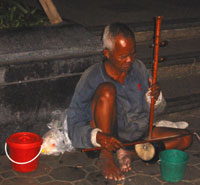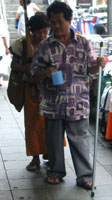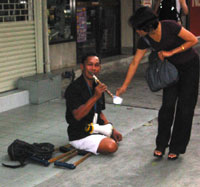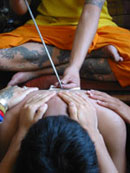Spare Any Change?
They can be found on the country’s busiest commercial roads, sitting on pedestrian overpasses, waiting at traffic lights or walking through market grounds and temple fairs. Hungry mothers with hungrier children, amputees, the unemployed and the addicts can paint some incredibly sad pictures as they sit hoping for some coins to be dropped into their cups. It’s not the most cheerful thing to talk about but people begging in Thailand can be quite difficult to miss. To give or not to give is the usual question.
It should come as no surprise that Thailand’s cities have a high number of panhandlers, especially Bangkok. The hope of striking it rich in the big city lures people from far and wide but this is often a dream and not a reality. Especially when compared to neighbouring countries, the amount of panhandling that goes on in Thailand is negligible and most often amiable.
In general, panhandlers tend to sit either playing an instrument or rather innocuously and hope for the best. It is uncommon to be hassled, grabbed or shouted at as you walk by. In the more popular tourist spots, though, people asking for money can get very forceful and stubborn and desperation sometimes fuels aggression.
hope for the best. It is uncommon to be hassled, grabbed or shouted at as you walk by. In the more popular tourist spots, though, people asking for money can get very forceful and stubborn and desperation sometimes fuels aggression.
Fortunately for the needy, the Buddhist-influenced Thai practice of making merit (‘tamboon’) and of being generous without strings attached (called ‘Dana’ in Pali) ensures that small donations are more frequently given out than one might think.
People trying to collect money on the streets very often play a musical instrument or sing into small karaoke machines and many are blind or disabled. There are very few community services offering assistance to these individuals and they often take to the streets as a way to make meager amounts of money.
Last year I visited a community of blind karaoke singers in the western part of Bangkok. Hundreds of blind entertainers resided in a poverty stricken seven-block area. The residents were incredibly independent, resilient and hardworking. The sense of community spirit and caring for each other was also impressive.
residents were incredibly independent, resilient and hardworking. The sense of community spirit and caring for each other was also impressive.
The daily schedule of these bands is a busy one. Tuk-tuks arrive at 6 o’clock in the morning and heavy loud speakers, chairs, microphones and keyboards are loaded into the backs of them with ease. Next the groups drive into the big city, find a busy street corner, unload all of the equipment, set it up and then proceed to spend the rest of the day singing.
After paying transportation costs, a five-member band averaged 200 baht for an entire day’s work (US$4.54). These street corner bands can provide some excellent entertainment at times and yes, I drop coins into their donation boxes.
For me it is not always so easy to tell if giving a few coins is a good idea. Unfortunately, the addictive habit of sniffing glue and popping amphetamines is on the rise in Thailand. This means that often you cannot be sure if your donation is going to be used to fuel this habit. I was alarmed a few weeks ago when I spotted a young boy standing on a busy intersection looking quite deranged with a plastic bag grasped desperately in his hand. He was addicted to sniffing thinner.
your donation is going to be used to fuel this habit. I was alarmed a few weeks ago when I spotted a young boy standing on a busy intersection looking quite deranged with a plastic bag grasped desperately in his hand. He was addicted to sniffing thinner.
There are also many tales of panhandlers sometimes being members of organised mafia like rings. This means that the people asking for money are dropped off and picked up by a boss who in turn takes all of their money away. I have been told that if you watch some panhandlers, there is a person on the street in charge of keeping an eye on how much money they are taking in. I have looked for this situation many times but never managed to confirm it. This does not mean that every panhandler is part of an organised scam. It is quite the contrary, in my opinion.
If you are unsure of whether or not your spare change will be used in a constructive way and if you have the time, an excellent solution is to go buy some food or drink and bring it back to the person in need of it. You can also invite them to come along with you for some food if you wish. Invitations and donations are typically greeted with smiles and enthusiasm.
Yes, there are panhandling scams in Thailand, but this is the exception, not the rule. Each individual comes up with his or her way of dealing with panhandlers. A Thai friend’s solution: “It is not possible to give money to everyone who asks you for it. The best thing you can do if you do not have enough money to give to someone is to take a moment and say a short prayer that wishes them well.” The warm-hearted nature of Thailand reveals itself again in this statement.
